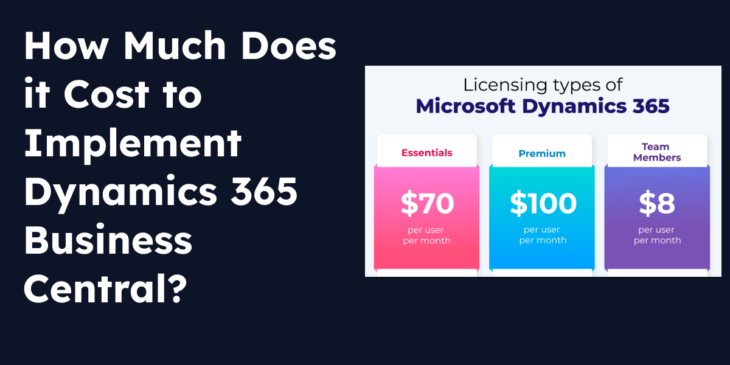
For growing American businesses, choosing an efficient and scalable ERP (Enterprise Resource Planning) solution is crucial. Dynamics 365 Business Central stands out as a favored option due to its flexibility and user-friendly nature. But a common question arises: What’s the cost of implementing Dynamics 365 Business Central? Let’s break down the cost factors and give you an idea of what to expect.
1. The Implementation Process of Business Central To grasp the costs involved, it’s important to understand the implementation stages of Dynamics 365 Business Central:
- Discovery Phase: Here, the team assesses your business needs and outlines the project scope.
- Design Stage: The solution is designed to align with the needs identified in the discovery phase.
- Configuration: Tailoring Dynamics 365 Business Central to fit the designed specifications.
- Data Migration: Transferring existing data into the new system.
- Testing: Ensuring everything works seamlessly.
2. Factors Influencing Implementation Costs Several variables can affect the cost of implementing Dynamics 365 Business Central:
- Business Size and Complexity: More extensive and intricate businesses will require a deeper level of implementation effort, impacting costs.
- Number of Users: Costs scale with the number of users needing access to the system.
- Customization Level: Unique customizations for your business can increase implementation expenses.
- Additional considerations include licensing fees, the need for new hardware or infrastructure upgrades, and ongoing support and maintenance.
3. General Cost Ranges While specific costs can vary, here’s a basic guideline for businesses in the USA:
- Small Businesses: Costs are generally lower due to fewer complexities and user requirements.
- Medium to Large Enterprises: Expect higher costs due to increased user numbers and a greater need for customization and integration.
Dynamics 365 Business Central Pricing Overview
Deployment Options: Dynamics 365 Business Central offers two main deployment choices: on-premises and cloud-based. This flexibility allows businesses to select the option that best fits their IT strategy and operational needs.
Subscription Models: Business Central is primarily available as a subscription service, offering different plans to cater to varying business needs:
- Essential Plan ($75/user/month):
- Ideal for small businesses with straightforward accounting and inventory requirements.
- Features include basic finance, accounting, inventory management, sales, and purchasing.
- Premium Plan ($100/user/month):
- Tailored for larger businesses with complex operations.
- Includes everything in the Essentials plan, plus advanced manufacturing, service management, and project management features.
- Team Members Plan ($8/user/month):
- A cost-effective option providing limited access.
- Suitable for users who need to view reports and data but do not require full editing capabilities.
- Business Central Device Licensing ($3,000/device/year):
- Perfect for companies using shared devices like warehouse scanners or point-of-sale terminals.
- Offers a device-based licensing approach instead of per-user.
- On-Premises Licensing:
- Allows deployment of Business Central on a company’s own IT infrastructure.
- Pricing is available upon request and is ideal for businesses needing complete control over their IT environment.
Dynamics 365 Business Central Pricing Models: A Comprehensive Guide
Introduction: Understanding the pricing models for Dynamics 365 Business Central is crucial for businesses planning to integrate this ERP solution. The two primary pricing models are Perpetual Licensing and Subscription-based Pricing, each catering to different business needs and preferences.
1. Perpetual Licensing:
- Best For: Businesses preferring a one-time payment and ownership of the software.
- Cost Structure: Involves purchasing the software license and paying for software assurance, which covers updates and support.
- Ideal Candidates: Companies with a stable IT budget, in-house IT staff for maintenance, and a preference for owning their software assets.
2. Subscription-based Pricing:
- Best For Companies favoring monthly payments and minimal upfront costs.
- Cost Structure: Based on a monthly subscription fee for access to Business Central.
- Ideal Candidates: Businesses without dedicated IT staff, prefer outsourced maintenance and updates; attractive to startups and small businesses.
Industry Suitability: Both pricing models are versatile, fitting a wide range of industries needing comprehensive business management solutions. The choice largely depends on the company’s financial strategy and IT infrastructure.
Typical Implementation Costs: Implementation costs vary based on business size, complexity, and requirements:
- Small Business: $10,000 – $30,000
- Medium-Sized Business: $30,000 – $75,000
- Large Business: $75,000 – $200,000+
Tips for Reducing Implementation Costs:
- Start Simple: Begin with a basic configuration and scale up as needed.
- Focus on Core Needs: Implement crucial features first, expanding over time.
- Utilize Existing Microsoft Investments: Leverage synergies with other Microsoft products like Office 365.
Conclusion: Choosing the right pricing model for Dynamics 365 Business Central depends on your business’s specific needs, size, and IT capabilities. Whether opting for Perpetual Licensing or Subscription-based Pricing, partnering with a qualified Microsoft Dynamics consultant, such as IFiXCRM Solution can ensure a cost.
Note: All the prices mentioned in this article are industry estimates and do not reflect the pricing structure of iFIXCRM Solution.